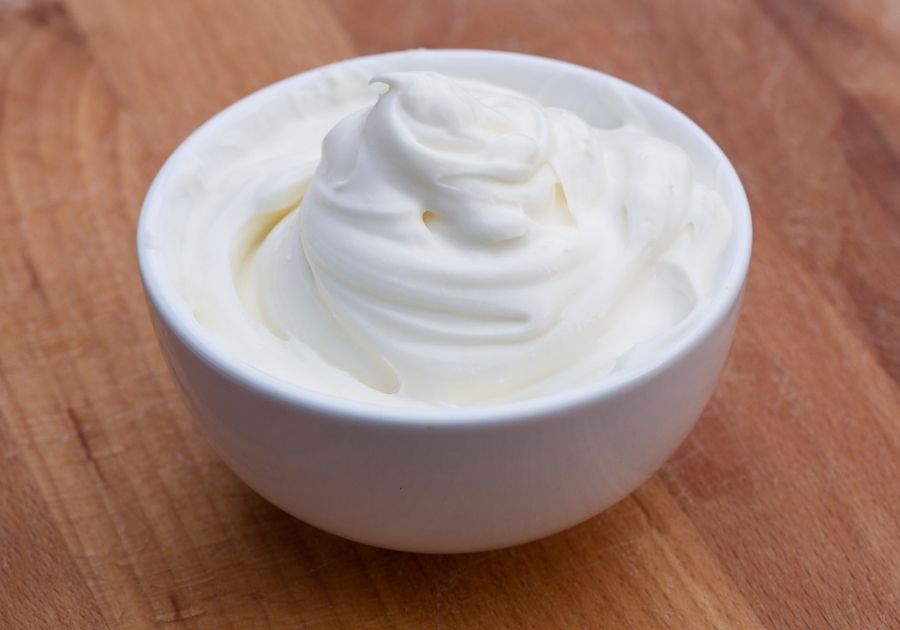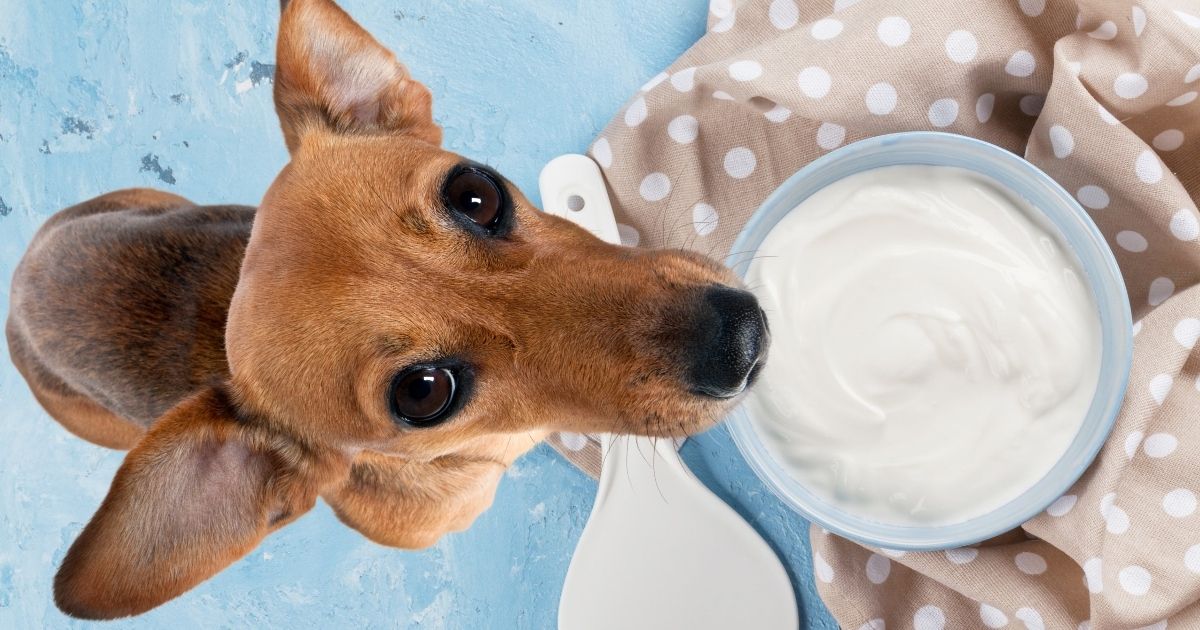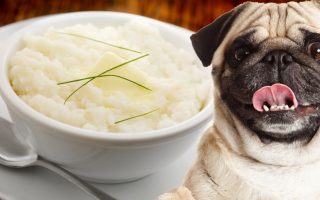Dogs share a bond with their family owners, and therefore it’s only right to refer or acknowledge them as part of the family.
As with many dog owners, you may feel you’re unjust to your pet dog when you don’t share with it what you have in terms of food.
Sour cream has been part of the human diet for a very long time and has been incorporated into several modern diets today.
But, can dogs eat sour cream? Is sour cream good or bad for dogs?
This article explores everything you need to know about this diary product before feeding it to your canine.
Is Sour Cream Good for Dogs?
Sour cream or soured cream is made through the fermentation of regular cream with lactic acid bacteria.
This bacteria is deliberately added to the cream or allowed to naturally sour, which thickens the cream and covert the sugar in it to a distinct sour taste.
In other words, sour cream is simply a fermented dairy product.
Crème fraîche is one typical example of sour cream. It has high-fat contents but a less sour taste.
Below is a breakdown of the nutrient value of 12 grams of sour cream
| Nutritional Info | Amount |
|---|---|
| Calories | 24 |
| Total Fat | 2.3 g |
| Sodium | 3.7 mg |
| Carbohydrates | 0.6g |
| Sugars | 0.4 g |
| Protein | 0.3g |
| Vitamin A | 1.1% |
| Vitamin C | 0.2% |
| Calcium | 0.9% |
| Iron | 0.1% |
Evidently, from the chart above, sour cream isn’t the best of snacks to treat your pooch to as they offer little or no nutrient value to benefit dogs.
Can Dogs Eat Sour Cream?
Sour cream contains too much fat content; hence, if regularly fed to dogs will result in unhealthy weight gain or obesity.
They also contain ingredients such as renin, vegetable enzymes, and gelatine that help make the cream thicker and stabilized but are potentially harmful to dogs.
However, they are still safe for dogs to consume if fed in moderation.

Before feeding sour cream to your dog, be sure your canine isn’t lactose intolerant, as most dogs are, and thus will experience difficulty digesting dairy products.
It is quite normal for dogs to develop lactose intolerance.
This usually happens during the transition from the puppy stage into adult dogs and no longer depends primarily on milk as nourishment.
Dogs that aren’t lactose intolerant can eat a moderate amount of sour cream without experiencing any issues.
Nevertheless, some may still experience vomiting and mild diarrhea, especially if you are feeding it to them for the first time.
Dogs have a sensitive stomach, and if they eat something unusual for the first time, vomiting occurs.
Hence, it is best you feed sour cream to your dog in minimal quantity in a single serving and observe how they react to it.
Is Sour Cream Bad for Dogs?
A moderate amount of sour cream is not likely to cause any severe health complications in your dog.
However, if excessively consumed, there definitely would be issues.
Below are some health consequences in dogs associated with excessive consumption of sour cream.
1. Weight Gain
Weight gain is a good thing until it becomes unnecessary fats that pose a health risk to a dog or affect their mobility function.
Sour cream contains a lot of fat that can cause obesity in dogs when regularly consumed.
2. Gastrointestinal (GI) Upset
High-fat content in sour cream can result in gastrointestinal problems in dogs, especially if such a dog has a history of pancreatitis.
This isn’t restricted to sour cream alone; excessive consumption of any meal high in fat will cause wreckage to the colon and rectum or gastrointestinal discomfort in dogs.
3. Xylitol Poisoning
Dairy products like sour cream usually contain artificial sweeteners, which enhances its taste.
This substance, however, can be deadly to dogs.
An example is xylitol, which is usually present in sour cream. Thus, when dogs eat too much sour cream, they can experience xylitol poisoning.
Some symptoms of xylitol poisoning in dogs include low blood sugar, fatigue, seizures, vomiting, etc — and if such a dog is not given proper medical attention could lead to coma.
Can Dogs Have Sour Cream?

Despite the risk associated with dogs consuming sour cream, can dogs have sour cream?
The answer is yes and no. As a loving dog caregiver, sour cream is not the best snack to treat your pooch to.
Nonetheless, once you’re clear your furry friend can indeed tolerate eating sour cream without any serious health complications or reaction, you can start feeding a bit to it.
However, you’ll need to figure out how much quantity is ideal for your dog in order not to exceed feeding it more than needed.
Dogs have unique biology and gut flora; hence the quantity that may be little for a Rottweiler Pitbull mix dog can be too much for a Teacup Toy Poodle — so you’ll have to be discreet.
It is best to give sour cream as a reward treat during behavioral training or practice.
Safer Alternatives To Sour Cream For Dogs
Dogs that are lactose intolerant and can’t have sour cream are totally not missing out.
There are other healthy alternatives they also can enjoy.
1. Organic fat-free plain yogurt
Plain yogurts are fat-free, contain less lactose, and are also are similar to sour yogurt.
They have more nutritional benefits than sour cream as they contain a higher percentage of protein, are effective probiotics for dogs, and are easily digestible.
Chances are, your dog will love these plain yogurt as much as they do love sour cream.
2. Doggy ice cream
These are specially made ice cream treats for dogs that are quite similar to dairy products but are free from their negative side effects.
They are a great alternative to feed your dog, especially on sunny days.
3. Kefir
Organic kefir is another fermented dairy product that is healthy and makes for a good alternative to sour cream. They are more like drinkable yogurt.
4. Banana mash
Banana mash is bananas grounded until they’re smooth and creamy.
They contain a lot of vitamins and minerals beneficial to dogs but should be fed to a dog in moderation as they contain sugars too.
This is a wholesome natural alternative to sour cream.
5. Peanut Butter
Regular peanut butter free from artificial sweeteners contains higher protein content than sour cream and thus is another better alternative to consider.
What Can I do if my Dog Eats Too Much Sour Cream?

If your dog has had too much sour cream, the first line of action is to limit its intake of it if there’s any left.
Next, you should observe it for any strange behavior or reaction over the next few hours.
Chances are your dog may be fine; however, if your dog is lactose intolerant it will experience vomiting, dehydration, stooling, and mild diarrhea, and may require a trip to the vet.
But if it isn’t too serious, this complication usually resolves on its own in most cases, but there are certain things you can do.
- Do not give your dog any meal for the next 12 hours aside from water. However, if it can’t drink water, give its small amount of unflavored Pedialyte.
- Feed your dog a bland diet (white rice without seasonings, plainly boiled chicken, or meat). Do this for 1-2 days.
- Do not give it any other treats
If symptoms still persist after trying the above, or you notice any adverse symptoms, take your dog to your veterinarian without delay.
Prevention is better than a cure, so it is best not to allow potentially harmful snacks or food to be accessible to your dog.
FAQs
Can dogs eat sour cream and onion chips (or onion pringles)
Onions are toxic to dogs! Hence you should not feed sour cream with any food containing onions to dogs.
Can I feed my dog sour milk?
Sour milk is filled with too much bacteria, which can cause gas, GI upset, vomiting, and diarrhea in dogs or even lead to bacteria poisoning.
So, you should not feed sour milk to your dog.
Can I feed my dog sour cream and cheddar chips?
Sour cream and cheddar chips are high in fat plus sodium and calories laden snacks.
A little will do no harm to your canine, but it is best not to feed it to your dog.
What happens if a dog eats sour cream?
If a dog has too much sour cream, the immediate side effects are gas xylitol poisoning, vomiting, and diarrhea.
Final Thoughts
Sour cream contains some beneficial nutrients for dogs, such as calcium, phosphorus, and other minerals.
However, they only exist in insignificant quantities and are offset by high amounts of fats, artificial sweeteners, and calories.
Hence, it is not ideal for feeding your dog.
But if you must feed your dog sour cream as a treat, it should be in very small quantity and not as a regular part of its diet.
You May Also Like:
Can Dogs Eat Grits? Are Grits Safe For Dogs?







